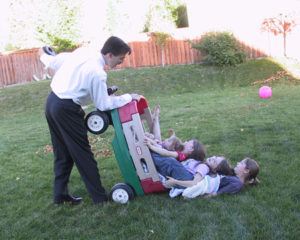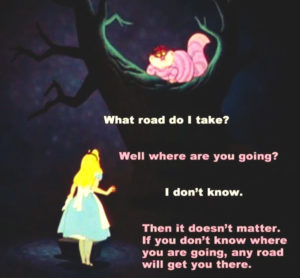Family Goal Setting and Why It Is Important
One day Alice came to a fork in the road and saw a Cheshire cat in a tree. “Which road do I take?” she asked. “Where do you want to go?” was his response. “I don’t know,” Alice answered. “Then,” said the cat, “it doesn’t matter which path you take.” (Lewis Carroll)
Just like with anything in life, you need to know where you are going and what you want to get out of it. Making plans about your family is no different than anything else! Talking to your spouse, making goals and setting some expectations helps in avoiding future disagreements and disappointments. This should a flexible plan; is not a contract, it should not be rigid! The only constant in life is change. “Life is what happens to you when you are busy making other plans.” — John Lennon While this is true it is still important to have some common goals and things to reach for.
- What do you want your family to be like

- What kind of family do you want to have
- Where do you see your family in 5, 10, 20 years
- What do you want your family interactions to be like
- How are you going to get there?
What do you want your family to be like?
This step is about your plans and expectations for how you want to structure your family.
- What is mom’s role?
- Does mom work outside the home?
- Do you have goals to one day find a way for mom to be home with the kids?
- Are you more traditional? Does mom stay home with the kids?
- What do you see as Mom’s responsibilities and what does your spouse see as “Mom’s” responsibilities?
- What is dad’s role?
 Is he the main provider?
Is he the main provider?- Does he work from home
- Does he own his own business?
- Does he stay home with the kids?
- What are dad’s responsibilities? What does your spouse see as “dad’s” responsibilities?
No matter what your thoughts are on these roles be careful to not make mom the slave or the maid. Mom shouldn’t have to do everything around the house just because she is the mom or because she is the stay at home mom. This behavior will make mom feel unloved and unappreciated. Resentments can grow from having all of the household on her shoulders.
Be careful that dad doesn’t just become the wallet. Keep dad involved for more than just money. He’s far more important than just being the family wallet. Dad stay engaged with the family. You are an important cog in the family wheel.
- Kids
- How many? How do you decide? (You may want to consider things like health, mental health, and finances)
- What do you expect of your kids? Behavior, discipline, activities, chores etc.
- Discipline and/or punishment- How? Discuss with your spouse how you want to discipline.
-
“Punishment calls for “retributive suffering.” But discipline is “training that corrects, molds, or perfects.” Punishment is directed at the child himself. Discipline is directed more at the objectionable behavior of the child; it is something we do for our children, not to them.” (Punish or Discipline by Layne E and Jana Squires Flake)
-
- What are your family rules?
- What kind of language do you use with them? This can be anything and everything from baby talk to swearing.
- Do you expect your kids to do things just because you said so or do you explain and help them understand natural consequences, punishments, etc.
 What Kind of Family Do You Want to Have?
What Kind of Family Do You Want to Have?
When all is said and done what kind of family do you want to have?
- Does your family get along or fight?
- Do members of the family show consideration and tolerance for one another?
- Are children and parents respectful of one another?
- Do you listen or is it my way or the highway?
- Do your children obey out of fear?
- Is your family service oriented?
- Can you be in the same room with one another without fighting?
- Do you eat dinner together?
- What activities do you do together and how often?
- How do you make sure you have family time?
- Are you religious? Do you go to church together? Do you pray together? Do you read scriptures together?
- Vacations? Where and how often?
- Does your family save? Budget? Talk about the families money and financial goals together?
- Do you read books that help with parenting and how to deal with things you lack knowledge in being able to handle better?
- Do you get help for family issues that are beyond your ability? Counseling, doctors, parenting classes, mentors, etc.
Talking with your spouse about your childhood and family experiences will help you to understand one another better. It will also help in figuring out what things you liked from your family of origin and what things you want to do differently.
My husband and I both came from families where there was a lot of yelling, fighting, swearing, and mistreatment of family members. This isn’t what we wanted in our family. We have chosen to not yell in our home. David O. McKay said: “There should be no yelling in the home unless there is a fire.” This has been our goal , we haven’t always succeeded but we do pretty good! There are many things we have chosen to do differently because of our experiences. It takes a lot of work, introspection, finding mentors and resources in order to do things differently.
We feel that it is our responsibility to take the good and improve on the not so good. We expect the same from our children. We know we haven’t been and aren’t perfect parents, but we really try. I believe that introspection and goals are a big key in taking the good and improving on the rest.
Some of our family goals are:
- Respect
- Understanding
- Tolerance
- Love for one another
- We want our kids to like being together. We want them to want to get together with us and their siblings when they have families of their own.
- We want to have fun together.
- We want them to have testimonies of Jesus Christ and His gospel
- We want them to know they are smart and capable people
- We want them to know we love them
- We want to laugh together, not at one another
How Do You Get There?
This is where you make smaller goals to get you to the end result of having a happy loving family.
I will share with you some of our goals that have made a big difference in our family.
- Focusing on the positive
- We have done family gratitude journals as well as individual. (The family one we did when we had kids too young to write.) Even really little ones can help and talk about things they are grateful for.
- Compliments- Check out my post on Teaching Children About Compliments
- Focus on the positives- when having to correct try to sandwich it between some good things
- Power of Positive Parenting: A Wonderful Way to Raise Children
– is a resource we used in deciding how to teach, discipline and do things differently.
- Praying together
- Explaining- You shouldn’t have to explain everything all of the time. However, if you understand why you are having to do something, aren’t you more willing to do it? Do you like being told what to do constantly without ever being told why?
- Listening- Are we listening to make our rebuttal and argue and fight or are we listening to understand?
- Trying to understand and see their point of view. Things aren’t always the way we think they are.
- Not taking things personally. My kids have never told me they hate me. They have told me they don’t like me very much right now. To which I have said, “That’s okay, I don’t like you very much right now either, but I do love you.”
- Not matching strong emotion for strong emotion. Kids need an example to be set in how to handle strong emotions. A calm adult can calm the situation down. Always remember you are the adult and must behave like one and model how you want them to behave.
- Respecting children brings respect to parents. Respect means making corrections when needed to a child’s behavior. I respect my children enough to want them to be good people. Respect teaches boundaries. Respect is treating them the way we wish we had been treated and want to be treated.

All my girls were being pulled in the wagon by dad and when he got tired, this is what happened. They loved this! We need to recreate this picture, now that they are older!
- Having family time: vacations, miniature golf, bowling, laser tag, playing in the backyard, playing games at the kitchen table, family night, family dinners, family prayer.
- We choose to be a religious family- we pray together, we read scriptures together, we discuss religious things and we worship together.
- Don’t be afraid to say sorry. Parents make mistakes. It’s important to show this example and to let your kids know that you know you didn’t handle something right. Especially, if you have hurt them in some way by your words and actions.
- Say “I love you” often
Religion has played a big part in our family. It is part of our values and our goals. We pray about everything and we know we have been inspired and lead and helped to do things differently because of our faith. We know that having goals and our end result in mind has helped us to shape our family into what we want. Over the years we have had to make adjustments and evaluate to make sure our family is still headed in the direction we want.
It takes work and it can be hard to look at ourselves and make the changes to be the parents and family we want to have, but it is worth it! Trying to improve is always worth it!








Leave a Reply
Your email is safe with us.